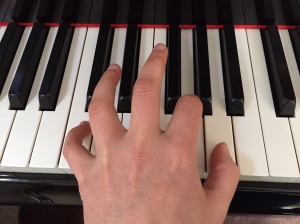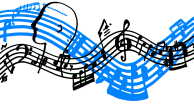After my less than auspicious performance a few weeks’ ago, I started thinking about how I could have diagnosed the problem and prevented the memory lapse before it occurred. Coincidentally, while I was pondering this, the fabulous Cross-Eyed Pianist penned a blog on the value of visualisation in performance, which was exactly what I’d been thinking about.
Visualisation – seeing something in the mind’s eye – is an incredibly useful tool for memorisation, as it provides a memorable pictorial representation of the piece in addition to auditory and analytical ones. There are of course different things one can visualise when trying to create a memorable pictorial representation of a piece:
- the keys played
- the look of your hands on the keyboard
- the score
- colours or shapes associated with sections of the piece
P ersonally, as a pianist, I find the first two of these particularly useful because if you look at your hands while playing, this is what you will actually see during performance. I try to visualise my fingers and the keys they will play while simultaneously listening to the piece in my head. If you know the piece well, listening mentally is better than listening to a recording as you can easily manipulate the tempo, and slow down to an extreme where it really is possible to hear, see and name every note as it goes past. This requires enormous concentration, but can be done anywhere away from the keyboard – sitting on the train, lying in bed, etc. I also find it useful to do twice, concentrating on each hand separately.
ersonally, as a pianist, I find the first two of these particularly useful because if you look at your hands while playing, this is what you will actually see during performance. I try to visualise my fingers and the keys they will play while simultaneously listening to the piece in my head. If you know the piece well, listening mentally is better than listening to a recording as you can easily manipulate the tempo, and slow down to an extreme where it really is possible to hear, see and name every note as it goes past. This requires enormous concentration, but can be done anywhere away from the keyboard – sitting on the train, lying in bed, etc. I also find it useful to do twice, concentrating on each hand separately.
This is incredibly revealing practice. If there is a section where you can hear the notes but cannot see them or name them in your head, then you don’t really know them! When I did this exercise with my ill-fated Haydn sonata, it was immediately apparent where the memory slip occurred – at a small jump where I had simply no idea, away from the keyboard, what notes I should be jumping to! And after that, I was unable to find a mental image to go with the mental sounds for several lines of music. I now know exactly where I need to concentrate my practice of this piece to sort out the memory problem.
I will definitely be incorporating this kind of mental workout into my practice regime before my next performance, no matter how small or apparently insignificant that performance might be.




Today I was revising another language I used to speak in the past by repeating some regular phrases. Then I’ve decided to try, with closed yes, to see mentally each word. Three hours later I can still recover most of those new words I repeated with closed eyes. I will similar practice to recover the music notes when I study the classical guitar.
I’m very pleased I saw this post. I’m always interested in how to improve memory. Like you I have found it to be quite natural, but the way I’ve been always able to memorise is mixture of 4 things : 1) I can see the music in my mind’s eye (part-photographic with marks or comments made on the page in addition); 2) aural (but not related to note names but rather hearing before playing; 3) I see hand shapes at the keyboard; 4) muscle memory, kinesthetic information.
I first realised I could see part-photographically when I memorised 4 pages of lines (straight) in lead role in a play 20 mins before the rehearsal without prompts, and again in a human biology exam when I visualised how the body was working whilst learning/reading.
I’ve even been able to learn part of a piece from memory through visualisation away from the piano for about 2/3 weeks and then recalled perfectly and musically as if I’d been playing for a while when I returned to the piano. I discovered this about 5 years ago, and would like to develop this more as I think its really useful when there isn’t a piano at hand.
I had never had a big memory lapse until recently. I ended up improvising during a performance of a competition until I could regroup. I’m not sure if it’s because I’m now older and have more to remember in life or a whether it’s a natural decline in memory, or just a momentary lack of focus. I’ve tried not to dwell on it but I would love to fix it before it happens again – or maybe we just have to accept this will happen from time to time.